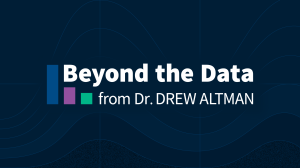Lessons From the Election About Voters and Health
 Hidden beneath all the election polling data that KFF collected was yet another lesson about framing health as an economic issue for voters: The only pocketbook concern voters cared about more than their health costs was the cost of food.
Hidden beneath all the election polling data that KFF collected was yet another lesson about framing health as an economic issue for voters: The only pocketbook concern voters cared about more than their health costs was the cost of food.
With Robert F. Kennedy Jr. and Dr. Mehmet Oz nominated to lead critical health agencies to “make America healthy again” (MAHA), it’s notable that what voters wanted wasn’t exactly a healthier country, it was to lower their health care costs. They weren’t voting on lowering the burden of chronic illness, which as RFK Jr. says on his website “is bankrupting America.” That’s certainly a worthy goal, and people do want to be healthier, but it wasn’t voters’ main goal in an election centered on the cost of living for so many.
Moreover, any cuts Republicans might make in the Medicaid and Affordable Care Act (ACA) to pay for tax cuts could exacerbate the out-of-pocket costs voters worry about most.
Neither Kennedy nor Oz have called for program cuts or generally for dialing back the federal role in health or federal spending. But in their positions, they would be saddled with the reality of BIG cuts and the controversy surrounding them if they happen, potentially derailing other agendas. If millions are losing coverage or forced into skimpier coverage, it will be tough to go on the Sunday shows and talk about much else. At the moment, it looks the health agenda will be bifurcated in the new administration, with HHS and its agencies driving the health and public health agenda, and the executive branch (the Office of Management and Budget, Domestic Policy Council, others in the White House), and Congress, driving changes and cuts to the big entitlement programs.
Arguably, the immediate purpose of the three giant programs Dr Oz will oversee—Medicaid, Medicare, and the ACA—is not health at all, but access to care and financial security. The determinants of “health” are complex and involve much more than insurance coverage. That’s why an MD is not necessarily a qualification for the job—although it doesn’t necessarily hurt—and some of the best Centers for Medicare and Medicaid Services (CMS) administrators have not been physicians.
To be fair, no pollster I know of asked voters how much they cared about reducing the burden of chronic illness compared with other health priorities (KFF can do so going forward). What we do know from prior polling however is that as a stand-alone issue “health care” ranked pretty far down voters’ issue priority list, behind the economy, immigration, democracy (for some voters), crime and other concerns. And remember, issues themselves are only one factor influencing voters.
However, framed as an element of voters’ economic concerns—the dominant issue in the election—health care costs were much more salient, ranking after the cost of food as an economic problem voters were VERY CONCERNED about, ahead of housing costs and the cost of gas. Given the dominance of economic concerns, it’s hard not to see the cost of health care as a much more important issue than it is generally given credit for being.
Possibly sensing this, and without any big health proposals of her own, Vice President Harris’ campaign presented her health plans as part of her economic package. In the end, even as Vice President Harris closed the gap on the economy, the strategy was overwhelmed by pro-Trump sentiment giving him a narrow win in the popular vote and a decisive one in the electoral college. In fact, voters said President-elect Trump was better able to handle high costs, including in health care, even as they generally trusted Vice President Harris more on health. We saw a similar dynamic on abortion, where strong support for reproductive rights and several state ballot initiatives did not translate into a Harris win.
Another lesson from the election is that language may also matter. Messages like “health care is a right” and “universal coverage” have deep meaning for many of us in health care. They are a statement of values and hard words to abandon as a matter of principle. But to some voters they are also signals of big government, liberalism, and the federal government, all of which can alienate them. Most voters are not endorsing health policy goals, they just want help with their health care bills. That’s why they will oppose some Republican ideas that initially sound good to them, like Medicaid block grants, when they learn they might cut their coverage or cost them more. And they’ll likewise oppose some Democratic ideas that sound too expansive or that can’t connect to their everyday problems.
The need to reframe health for voters as a pocketbook issue will also be central to the competition for the votes of working class and Latino voters, two groups very focused on the cost of living.
Health was not a flashpoint between the candidates in this election. One had modest proposals and the other, intentionally, said next to nothing. Health care can be a big issue in elections if controversial cuts are being made in health programs, or a health reform plan is the focus of debate. Neither applied in this election. But the role people’s health care costs played as an economic issue for voters was under-appreciated. There is a video of me on C-SPAN speaking to the old Alliance for Health Reform (now renamed) presenting polling arguing for framing health care as an economic issue around the time of the Clinton health reform debate. That was in 1993! I guess I haven’t stopped. Neither have the voters.
